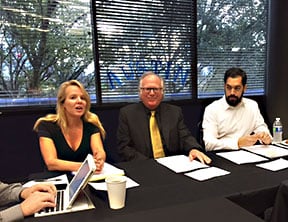Open Government
Open government advocates notch legislative wins but want more
Law Enforcement Lobby Blocking Family Access to Info About Deceased Suspects
Court Guts Open Meetings Act
County Attorney Reports Lessons Learned
Why Acting Ethically, Legally Matters
Why Acting Ethically, Legally Matters
Many a high-profile scandal persisted for
years because nobody stepped forward
by Ken Martin
© The Austin Bulldog 2015
Part 1 in a Series
Posted Tuesday April 14, 2015 9:41am
A president of the United States used his office to have sex with an intern. A Penn State assistant football coach was convicted of 45 counts of child sex abuse. And a world famous comedian is a serial rapist?
 What Bill Clinton, Jerry Sandusky, and Bill Cosby have in common is that nobody stepped forward or spoke up to expose these men early on when they violated women and children.
What Bill Clinton, Jerry Sandusky, and Bill Cosby have in common is that nobody stepped forward or spoke up to expose these men early on when they violated women and children.
Ta-Nehisi Coates, a journalist who wrote an article about Cosby published in 2008 by The Atlantic, knew about the rape allegations and barely mentioned them in what he wrote.
The year 2008 was a time when Barack Obama was running for president and Cosby was making speeches he said were “call-outs” to black men for self-reliance and striving.
The only mention of Cosby’s misdeeds with women in Coates’ 7,000-word article was literally a parenthetical remark: “(In 2006, Cosby settled a civil lawsuit filed by a woman who claimed that he had sexually assaulted her; other women have come forward with similar allegations that have not gone to court.)”
Last year, as a growing number of women were publicly telling their stories about being Cosby’s victims, Coates looked back at his failure to fully report on the rape allegations, noting he was having his first big shot at writing for a national magazine. “But Cosby was such a big target that I thought it was only a matter of time before someone published a hard-hitting investigative piece. And besides, I had in my hand the longest, best, and most personally challenging piece I’d ever written.
“It was not enough,” he wrote in The Atlantic of November 19, 2014.
“I don't have many writing regrets. But this is one of them,” Coates wrote. “I regret not saying what I thought of the accusations, and then pursuing those thoughts. I regret it because the lack of pursuit puts me in league with people who either looked away, or did not look hard enough. I take it as a personal admonition to always go there, to never flinch, to never look away.”
A call for responsibility
City Holding Open Government Symposium
City Holding Open Government Symposium
Continuing legal education credits for lawyers and
great information for advocates of open government
by Ken Martin
© The Austin Bulldog 2015
Posted Wednesday April 8, 2015 11:15am
The City of Austin will hold its second Open Government Symposium tomorrow, Thursday, April 9 at City Hall.
The all-day event will offer seven different presentations, some of which are running concurrently to provide options for attendees. The sessions will cover ethics, litigation developments, legislative developments, open government innovations in the state and internationally, and open government issues beyond the city.
 Travis County Attorney David Escamilla is on the program to speak at the Symposium and is enthusiastic about the city again holding this important event.
Travis County Attorney David Escamilla is on the program to speak at the Symposium and is enthusiastic about the city again holding this important event.
“By holding this symposium the City of Austin is recognizing that open government and transparency are important,” Escamilla said.
Escamilla is the official who conducted a 21-month investigation of the previous Austin City Council’s longstanding practice of violating the Texas Open Meetings Act, by holding regularly scheduled two-on-one and one-on-one private meetings, in effect establishing a “walking quorum” that constituted a conspiracy to evade the Act.
That investigation was triggered by the The Austin Bulldog’s investigative report that exposed the illegal practice.
 Attorney Bill Aleshire of Aleshire Law PC, a strong advocate for increased government accountability—and The Austin Bulldog’s attorney for two lawsuits involving the City of Austin’s refusal to comply with the Texas Public Information Act—said, “I hope the ‘New Way Forward’ (advocated by Mayor Steve Adler) will have a subtitle ‘Let’s Get Real,’ and nowhere in the City’s management is there more need to get real than in the pretense City Manager Marc Ott’s administration has given to transparency in government.
Attorney Bill Aleshire of Aleshire Law PC, a strong advocate for increased government accountability—and The Austin Bulldog’s attorney for two lawsuits involving the City of Austin’s refusal to comply with the Texas Public Information Act—said, “I hope the ‘New Way Forward’ (advocated by Mayor Steve Adler) will have a subtitle ‘Let’s Get Real,’ and nowhere in the City’s management is there more need to get real than in the pretense City Manager Marc Ott’s administration has given to transparency in government.
Do You Want Open Government?
Want More Open Government?
Key lawmaker and nonprofit advocacy group
pitch for public support on pending legislation
by Ken Martin
© The Austin Bulldog 2015
Posted Thursday March 19, 2015 3:01pm
 State Representative Todd Hunter (R-Corpus Christi), who chairs the powerful House Calendars Committee, and the two co-chairs of the Freedom of Information Foundation of Texas laid out the details of proposed legislation that the press and other open government advocates hope will succeed. And some they wish are tossed into the trash heap.
State Representative Todd Hunter (R-Corpus Christi), who chairs the powerful House Calendars Committee, and the two co-chairs of the Freedom of Information Foundation of Texas laid out the details of proposed legislation that the press and other open government advocates hope will succeed. And some they wish are tossed into the trash heap.
Among the array of proposed legislation are bills that if enacted would:
• Empower governmental agencies to compel public officials to turn over records that constitute public information,
• Make public the records of campus police at private institutions of higher education,
• Reemphasize that journalists may legally report on whistleblower allegations of public concern,
• Raise the bar for closing juvenile courts to the public,
• Remove public notices from printed newspapers,
• Disregard public information requests from non-Texans, and
• Authorize the Texas Attorney General to prosecute violations of the Texas Open Meetings Act or Texas Public Information Act when local county and district attorneys decline to do so.
Hunter, who has served eight terms in the Texas House, four as a Democrat and four as a Republican, authored two of these proposed bills.







